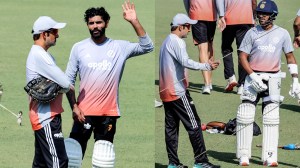Denmark puts Prophet row behind, Syrian-born set to play kingmaker
A campaign poster for this week’s national elections evoked some of quiet Denmark’s most turbulent days...

A campaign poster for this week’s national elections evoked some of quiet Denmark’s most turbulent days: the wave of Muslim rioting against cartoons of Prophet Muhammad printed last year in a Danish newspaper.
Displayed at campaign rallies of the nationalist Danish People’s Party, it depicted an artist’s hand drawing a picture of Muhammad with the text “Freedom of speech is Danish, censorship is not”.
But the poster hardly registered with voters and provoked no Islamic backlash. Instead, a small centrist party led by a moderate Danish Muslim is poised to play kingmaker in the Tuesday ballot — emerging as the possible partner Prime Minister Anders Fogh Rasmussen needs to keep his Centre-Right governing coalition afloat.
It’s all a sign of how the ethnic and religious strife that roiled the Scandinavian nation in early 2006 has largely lost its sting, even though support for tight immigration laws remains high.
Syrian-born Naser Khader, leader of New Alliance, is campaigning to soften the influence of the Danish People’s Party, known for its harsh rhetoric on immigrants, especially Muslims. The populist party has been the Government’s key ally since Fogh Rasmussen took office in 2001, and has been instrumental in the tough new stance on immigration. The group holds no Government positions.
“We would like to have a Government around the Centre, that is the dream scenario,” Khader said. “What is important is influence, not getting a Government position.”
After 13 years with the centrist Radical Party, which until 2001 played a pivotal role in Danish politics, Khader broke away last May to create New Alliance.
During the cartoon crisis, Khader formed a network of moderate Muslims and made public appearances with Fogh Rasmussen, presenting himself as a counterbalance to extreme Islamists. Those cushy ties with the Prime Minister angered Khader’s Radical colleagues and led to his breakaway.
Fiery protests swept across Muslim countries in January and February 2006 as a reaction to a Danish newspaper’s decision to publish 12 caricatures of Muhammad in what it said was a challenge to self-censorship among artists dealing with Islamic issues.
The Danish People’s Party’s evocation of the cartoon crisis in its campaign poster appears to have backfired. The placard has been ignored by lawmakers across the political spectrum, and even by the Islamic group that spearheaded the anti-cartoon protests. Surveys show the party has bled some support recently.
“No one wishes to provoke anyone for the sake of provocation,” said Lars Bille, a political scientist at the University of Copenhagen. “That’s a lesson learned from the Muhammad crisis.”
With Fogh Rasmussen’s Government bloc enjoying a narrow lead in opinion polls over the Social Democratic-led opposition side, Khader’s party could have the decisive say in whether Fogh Rasmussen secures a third term.





- 01
- 02
- 03
- 04
- 05


























